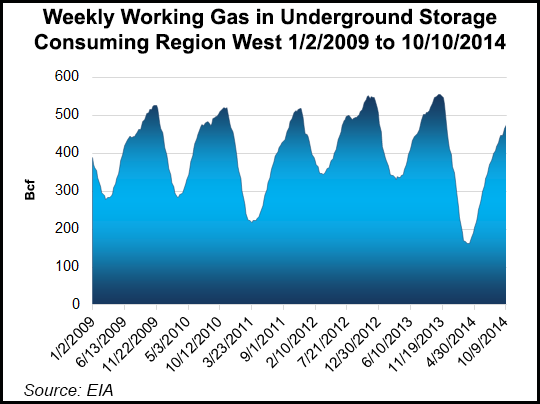Markets | Infrastructure | NGI All News Access | NGI The Weekly Gas Market Report | Regulatory
Arizona Eyes Robust Winter Gas Supplies, Warmer Weather
Arizona regulators said Tuesday in an annual conference with major suppliers and distributors in Phoenix that the state has robust natural gas supplies for this winter, which is expected to be warmer and wetter than normal.

A major utility that serves the state, Southwest Gas Corp., estimated that this winter’s gas prices would be $4.24/Dth in the Phoenix area, compared with $3.91/Dth a year ago and $3.99/Dth in 2012-13.
Two major interstate pipelines — Transwestern Pipeline Co. and El Paso Natural Gas Pipeline — presented positive outlooks in terms of their systems’ readiness and integrity given increasing federal-mandated requirements for more stringent safety checks.
Transwestern cited its new compressor station, New River, which permits spot flows of 1 Bcf/d to a number of gas-fired generation plants in the state, along with noting the Phoenix lateral will provide 260 MMcf/d capacity in the winter months, as well as 116 MMcf/d on its Mainline West in the next two years before bumping up to 183 MMcf/d capacity in 2017.
El Paso showed overall throughput lagging behind the 2009-2013 five-year average for most of this year, although ahead of the past two years for most of 2014. Supplies from the San Juan Basin are down well below the previous five-year average, but Permian Basin supplies are well above, hovering around 2 Bcf/d, compared to the five-year average that is below 1.5 Bcf/d.
In the event of another historically cold winter across much of the nation, El Paso’s Kevin Johnson, director of the western region gas control, said there is the “potential for coordinated emergency operational assistance among TransColorado Gas Transmission, Colorado Interstate Gas, Natural Gas Pipeline, and El Paso.”
Salt Lake City-based Questar Corp. reported that its Southern Trails Pipeline met all of the federal safety check requirements, including a Pipeline and Hazardous Materials Safety Administration (PHMSA) audit on maintenance, cathodic protection, integrity management and emergency preparedness.
Southern Trails was completely hydrostatically tested in 2001 before it was converted from an oil-carrying pipeline to one carrying natural gas (see Daily GPI, May 30, 2002).
“The utilities outlined their plans for meeting winter demand and Arizonans can rest assured that supplies are robust,” said Arizona Corporation Commission (ACC) Chairman Bob Stump. “A warmer-than-normal winter has been forecast, and Arizona’s utilities appear prepared to meet [everyone’s] energy demands during our colder months.”
Regulators were briefed on the companies’ emergency plans to deal with any potential service outages and how they are working to assure adequate supplies and staffing, an ACC spokesperson said. “Commissioners also questioned whether there were adequate systems in place to notify customers and field inquiries, especially those customers with health or safety needs.”
In addition to Southwest Gas, Transwestern, El Paso and Questar, UNS Gas and Alliant Gas also made reports to the five-member ACC.
© 2024 Natural Gas Intelligence. All rights reserved.
ISSN © 1532-1231 | ISSN © 2577-9877 | ISSN © 1532-1266 |
